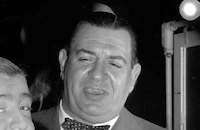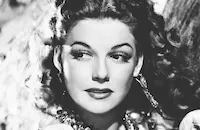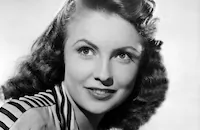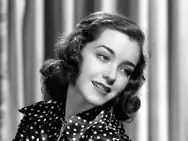Winter Carnival
Cast & Crew
Charles F. Riesner
Ann Sheridan
Richard Carlson
Helen Parrish
James Corner
Alan Baldwin
Film Details
Technical Specs

Synopsis
Jill Baxter returns to New York from Reno to find that her divorce from Russian Duke Alexi has put her face on the front page of every paper. Trying to avoid reporters, she boards a New England train in the yards, thinking that it is the train to Canada. When the train pulls out, however, she learns that it is the train bound for the winter carnival at Dartmouth University, where she was crowned queen six years earlier. Jill's sister Ann is aboard the train and tries to convince her sister to spend two days at the carnival. Jill, fearing publicity, insists upon waiting at the Hanover station for the Montreal Express. Hanover is buzzing with activity, with the two busiest spots being the offices of Don Reynolds, the editor of the Dartmouth Graphic , and the pressing establishment that provides money to support Mickey Allen, Dartmouth's best skier and Ann's beau. Supervising various preparations is John Weldon, one of the school's most popular professors and Jill's former sweetheart who still carries a torch for her. At the Hanover station, Jill is spotted by reporter Tiger Reynolds, Don's father, who informs Weldon. With conflicting emotions, Weldon goes to meet Jill. That night, Ann is chosen Queen of the Carnival. Her selection intrigues Count Olaf Von Lundborg, the Norwegian ski champion, and his attention causes Ann to ignore Mickey. At the fraternity house, Jill urges Ann to forget the count, but Ann resents her sister's intrusion. Meanwhile, Don receives a message intended for his father that Jill's ex-husband is enroute to Hanover with a trainload of reporters, and he decides to scoop the New York dailies with the exclusive story. The next morning, Don warns Jill that her ex-husband is on his way, and helps her plan a getaway. At the station, Tiger tells the reporters that Jill has gone, and Don learns that his father is unemployed. Don offers to quit school, but Tiger insists that he complete his education. Meanwhile, at the ski competition, Mickey beats the count, who then bids Ann goodbye and tells her he is to meet his fiancée the next day. Mickey and Ann make up and return to the house, where they see Jill and Weldon together. Ann then explains how she jumped off her train and that she and Weldon have decided to renew their romance.

Director

Charles F. Riesner
Cast

Ann Sheridan

Richard Carlson

Helen Parrish
James Corner
Alan Baldwin

Robert Armstrong
James Butler

Virginia Gilmore

Joan Brodel

Marsha Hunt
Morton Lowry

Cecil Cunningham
Robert Allen
Susan Mccash
Molly Mccash
Kenneth Stevens
Benny Drohan
Martin Turner
The Tudor Williams Male Chorus
Florence Pepper
Mary Jane Barnes
Phyllis Howell
Eleanor Riley
Roberta Wilson
Jean Lucius
Jean Broughton
Alyne Sherry
Peggy Moran
Dick Winslow And His Orchestra
Dick Durrell
Stephen Whitney
Joe Roberts
Winton Reynolds
Dale Fellows
Douglas Meins
Pat Hurst

Robert Walker
Edward Brian
Paul Portanova
Lois Ranson
Carlyle Blackwell Jr.
Crew
Ray Binger
Lester Cole
Eve, Saks Fifth Avenue
Merritt Gerstad
L. Wolfe Gilbert
Bert Glennon
Julia Heron
Ray Hines
Richard Irvine
Werner Janssen
Werner Janssen
Daniel Keefe
Charles Kerr
Fred Lau
Otho Lovering
Edward Montagne
Maurice Rapf
Maurice Rapf
Budd Schulberg
Budd Schulberg
Dorothy Spencer
Alexander Toluboff
Walter Wanger

Film Details
Technical Specs

Quotes
Trivia
F. Scott Fitzgerald, originally assigned to write the picture, was dismissed in a humiliating scene in front of the Hanover Inn during the 1939 Carnival.
Notes
The summary and credits for this film were obtained from a cutting continuity deposited with the copyright records. According to the Variety review, Walter Wanger, Budd Schulberg and Werner Janssen were all Dartmouth alumni. On the first draft of the copyright records, Schulberg was credited with the original story. On the second draft, however, Corey Ford was credited with original story and Schulberg shared story credit with Maurice Rapf. According to a news item in Hollywood Reporter, the ice carnival footage was shot at Dartmouth College by Bert Glennon. Another item in Hollywood Reporter notes that Kay Kyser and his band wanted $75,000 to appear in this film. The deal fell through, however. This picture marked the screen debut of actors Robert Walker (1918-1951), Virginia Gilmore (1919-1986) and Alan Baldwin. Wanger borrowed Baldwin from Samuel Goldwyn's company for the production.












